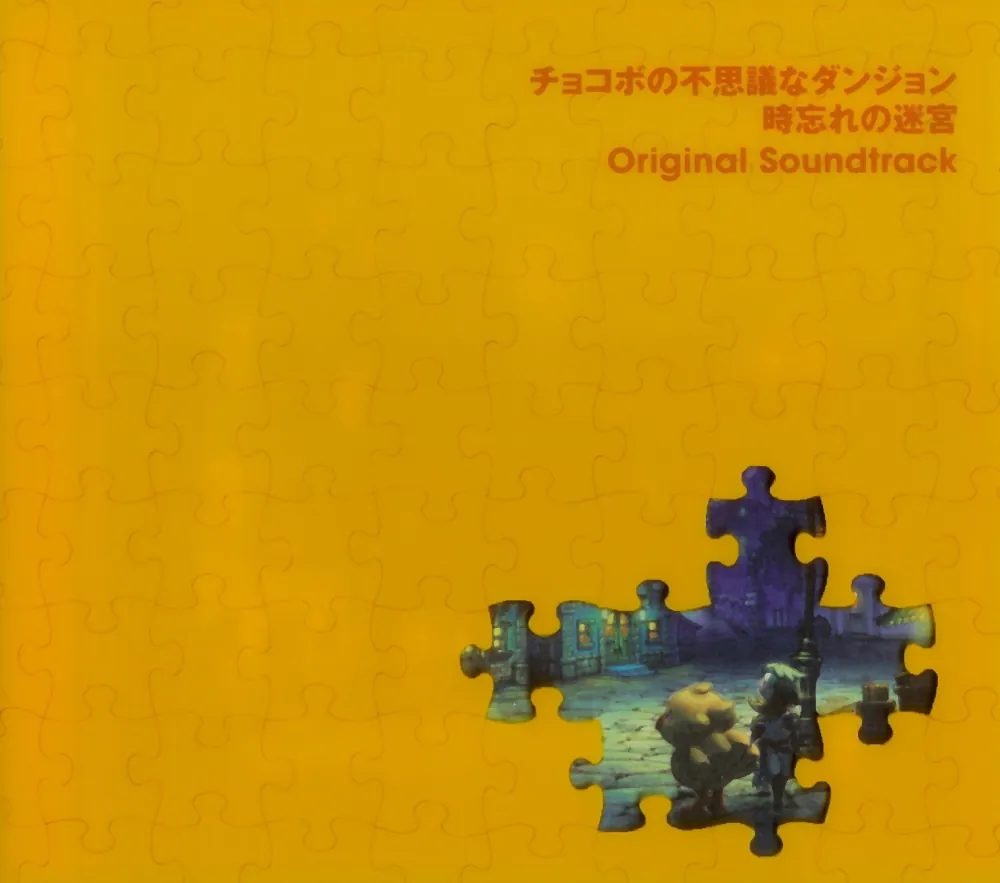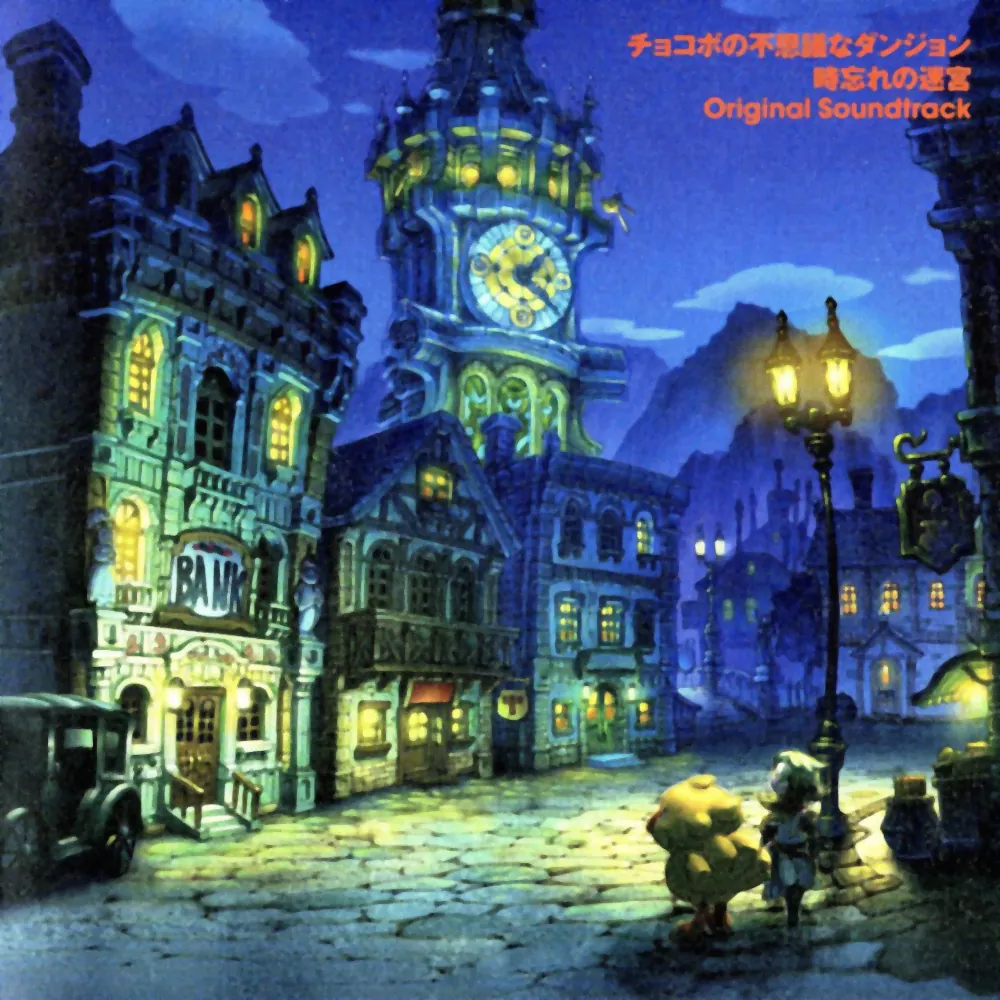Chocobo’s Mysterious Dungeon: Labyrinth of Forgotten Time, whose localized title is Final Fantasy Fables: Chocobo’s Dungeon, has yet to receive an English-language release date. Nevertheless, the game’s official soundtrack has already made an impression on a number of importers. Comprised mostly of arrangements from Final Fantasy I through XI, the music of Labyrinth of Forgotten Time, remixed by Joe Down Studio’s Yuzo Takahashi, is often marked by moments that exemplify why Nobuo Uematsu’s themes have remained among the most enduring in videogames.
Few enough Square Enix titles have founded their entire soundtracks upon compilations of previous games (as of yet) for the score to this, the first conventional Square Enix action role-playing title for the Nintendo Wii to assert itself as an innovative approach. The Nintendo DS title Final Fantasy Fables: Chocobo Tales applied a similar technique to its original score. The portable title, handled by the same Sapporo-based music developer, served as a successful trial run. Having graduated from the technical limitations of the DS sound card, Joe Down in Labyrinth‘s soundtrack explores a variety of musical conventions. As a matter of fact, these arrangements might end up garnering more attention than the game title to which it is attached.
Final Fantasy Crystal Chronicles‘ Kumi Tanioka contributes the Wii title’s two original non-vocal tracks. The “Labyrinth of Forgotten Time” Main Theme subtly incorporates the well-worn chocobo melody through a series of delicate background chimes. Not unlike the yuletide atmosphere of Masashi Hamauzu’s “Chocobo Happy Christmas” album, the subtlety of Tanioka’s approach frames the project in a peaceful mood, in opposition to the mascot’s occasional portrayal as an excitable, flighty avian.
Though the score is dominated by songs from 8-bit titles and the Super Nintendo, a few more recent additions to the Final Fantasy series have been subtly adapted. Hamauzu’s “Thunder Plains” theme from Final Fantasy X, a song originally set under a lightning-streaked night sky, has been softened in tone to fit a daytime scene. The sound effects of spinning clock wheels and ticking gears have been relieved of their danger and menace with positive overall results. Junya Nakano’s memorable esper battle theme from the same game returns, with bombastic momentum propelling the sounds of its deep bellied drums and brass horns. Tunes from Final Fantasy XI by Tanioka and Mizuta also make an appearance, though the digital sound quality of the original compositions allows Joe Down less room for experimentation.
Where the soundtrack is noticeably most imaginative is in its treatment of sounds from earlier entries in Final Fantasy‘s twenty-year history. The effect of hearing themes that were previously the products of 8-bit NES and Famicom sound cards, now reconceived with live instruments and elaborate synthesizer effects, may remind some listeners of the days when Square regularly published arranged albums and piano collections as companion pieces to their most popular original scores. The song “Memory of a Distant Day” draws from the vocal rendition “My Home Sweet Home” from Final Fantasy V: Dear Friends by incorporating humming for phrases where English-language vocals had previously been sung. The live orchestration of Final Fantasy‘s “Chaos’ Temple,” devoid of pretense and skillfully executed, is fittingly titled “Nostalgia.” Innovative touches, like transitioning between MIDI and symphonic renditions of the Final Fantasy II dungeon battle theme demonstrate the extent to which the musicians fully embrace well defined concepts to individualize selected tracks.
Labyrinth of Forgotten Time‘s “Guardian of Water 2” from Final Fantasy V is an atmospheric dungeon theme whose melody is rich enough that those who played through the Super Famicom import years ago will be able to call it instantly to mind. Yet the contemplative quality of the piece makes it a far-from-obvious choice to single out among the original soundtrack’s track list. In a similar vein, “Town at Night” is adapted from the first part of Final Fantasy VI‘s “Epitaph.” The tranquil quality of the composition, complemented by the soft patting of a wood drum, lends a somber atmosphere to the piece. The pattern of inconspicuous selections from across the board continues with Final Fantasy VII‘s “Farm Boy,” adapted with a strumming acoustic guitar as “Stella Ranch.” Between Square Enix’s selection of tracks and the meticulous concern discernible in Joe Down’s approach, the results are often characterized by delicate and exacting care.
More visceral in its impact, Final Fantasy IV‘s “Battle with the Four Fiends” was chosen with good reason by Takahashi as his favorite song in the game. Of comparable intensity is the oft-revisited Gilgamesh theme “Battle on the Big Bridge,” here dubbed “Raffaello Battle.” “Dungeon Hero X” is a catchy arrangement of Final Fantasy VIII‘s unforgettable “The Man with the Machine Gun.” Introducing vocal samples electronically diffracted to match the song’s spacey keyboard effects, the song forcefully captures the energy of the original tune at a slightly more intense tempo. Adapted from perhaps among the most effective of Final Fantasy IX‘s original tracks, “Fragment of Memory ” brings together the lighthearted synthesizer intro to the game’s overworld theme and the richness of acoustic instruments found in the live recordings of “Melodies of Life.” These songs illustrate a pattern found in much of Takahashi’s dexterous work as an arranger in accentuating the novelty of Uematsu’s songs so that they retain their character and remind us of why it was that the music of Final Fantasy came to be celebrated.
Square Enix has received criticism previously upon embarking on remake projects for introducing a veneer of self-importance that was never present in the original titles. Musically, this flaw has been particularly apparent in the 20th anniversary handheld edition of the original title for the PSP and the preoccupation by the earlier Game Boy Advance ports to trumpet its own magnificence. The flourishes at times managed only to neutralize the modest appeal of Uematsu’s often bittersweet tone. In such a context, Joe Down Studio has proven more effective in maintaining enough distance from the intimidating status of the Final Fantasy brand to bring out the unpretentious poignancy that has always been an unspoken strength of the series’ music.





